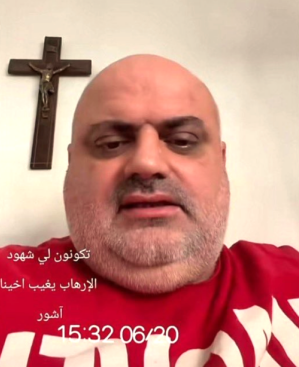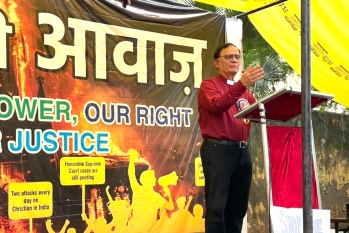
An Iraqi Christian was stabbed to death on Friday (Sept. 10) while livestreaming on TikTok about his faith outside his apartment in Lyon, France.
Ashur Sarnaya, a disabled Assyrian Christian who used a wheelchair, had fled persecution from terrorist group Islamic State (IS) in Iraq and had reportedly stated that he received threats in online comments and anonymous phone calls. He was 45.
The attack reportedly happened before 10:30 p.m. near his apartment at 53 Rue Sergent Michel Berthet in the 9th arrondissement. Witnesses reported that the assailant waited for Sarnaya and stabbed him in the neck.
The regional daily news website Le Progrès reported that the attacker severed Sarnaya’s carotid artery and fled. Le Progrès reported that Sarnaya suffered cardio-respiratory arrest when emergency services arrived and could not be revived.
“In a video clip still online Thursday morning, we see the victim, authenticated by relatives, with blood on his face, visibly flowing from his nose and mouth,” Le Progrès reported.
A witness showed news agency AFP a video of “a person seen from behind leaving the scene, wearing dark clothing and a hood over his head, whom he identified as the perpetrator of the murder,” according to Le Progrès.
A police source told Le Progrès that authorities are not yet prioritizing a theory on motives for the murder.
“Nothing points us in the direction of a solid line of inquiry, whether criminal, political, religious, or drug-related,” the officer reportedly said. “He was very active on social media; we are working on that.”
Sarnaya left Iraq in 2014 to escape Islamist persecution and lived with his sister in France. He often shared Christian messages in Arabic online, stated the Observatory on Intolerance and Discrimination Against Christians in Europe (OIDAC Europe). Sarnaya had reportedly stated that Muslim social media users harassed and attacked him.
“Many Christian organizations in France have condemned the murder and are calling for Christians in the Middle East to be able to practice their faith safely and live with dignity,” stated OIDAC Europe. “Indeed, this murder is unimaginable given Ashur’s history of fleeing persecution.”
Sarnaya shared testimonies of faith in Arabic on social media, and in March he stated that was physically attacked by Muslims, according to Catholic News Agency. In one instance cited by Aleteia France, he said his content was blocked or suspended as a result of reports by Muslims, the agency reported.
The president of the Assyro-Chaldean Association of Lyon, Georges Shamoun Ishaq, told Catholic media that Sarnaya was “a very kind, discreet person, deeply believing, who liked to speak about the Christian faith,” according to the Catholic News Agency.
Lyon’s prosecutor has launched an intentional homicide investigation. The Organized and Specialized Crime Division (DCOS) has taken on the investigation.
OIDAC Europe cited the murder as an example of anti-Christian acts in France, which increased by 13 percent in the first half of 2025.
“OIDAC Europe has been highlighting the vulnerability of Christian converts in Europe to various international organizations, and continues to emphasize that governments must ensure the security of all believers in Europe, including converts. This is a human rights concern, not a political issue,” the group stated.
OIDAC Europe referred to a new guide on anti-Christian hate crimes that highlights the vulnerability of Christian converts in Europe and urges governments to ensure better protection. The guide was published by the Organization for Security and Cooperation in Europe (OSCE) and its Office for Democratic Institutions and Human Rights (ODIHR).
“Given many of those affected are refugees who have fled persecution in their country of origin, the impact of such hate crimes can intensify the trauma they have already endured, increasing their need for support services,” the guide states.
OIDAC Europe update added, “Ashur Sarnaya’s tragic death reminds us not only of the need for further government action but for society as a whole to stand in solidarity.”






